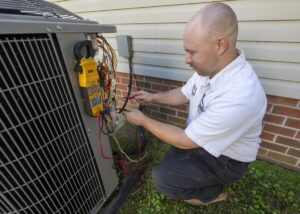What are the symptoms of a bad AC capacitor?
You step inside on a blazing day expecting a wave of cool air—and instead, you’re met with stillness or warm airflow. You check the thermostat. You hear the hum of the system trying to work, but nothing’s happening. You walk outside, and the fan isn’t spinning. Something’s off.
At Five Star Services, we’ve seen this scene play out thousands of times. And the culprit? Often, it’s the capacitor. Let’s walk through how to spot the signs of a blown AC capacitor, what it does, when to call us, and how we fix it. No fluff. Just real talk from stubbornly honest AC repair techs who don’t mess around.
What Does an AC Capacitor Do?
Think of the capacitor as the battery that gives your AC system the initial kick it needs to start up—and the muscle to keep running. Your system has one for the compressor and often one for the fan motor. Some setups use a dual-run capacitor to handle both jobs in one canister.
Every time your AC cycles on, the capacitor sends a high-voltage jolt to get the fan spinning and the compressor pumping. Without it, nothing gets going. And just like batteries, capacitors wear out. They fail quietly… until they don’t.
Signs Your AC Capacitor Might Be Blown
1. Your AC Doesn’t Turn On
This one’s obvious. If your thermostat clicks, but the system doesn’t come to life, the capacitor could be toast. It may try to start and fail, or it might not respond at all.
2. You Hear a Hum But No Action
This is one of the most common signs. The motor tries to start, but without that extra push, it just hums in place.
3. The Fan Isn’t Spinning
Step outside. If the fan on your outdoor unit isn’t moving—but you hear electrical noise or the system’s humming—that’s a red flag. Sometimes, people try to spin the blades manually with a stick. That can give it a jump for a few seconds, but the problem isn’t solved.
4. The AC Blows Warm Air
If the compressor isn’t running, the refrigerant isn’t cycling. That means your indoor fan may still blow air, but it’s room temperature and not cool.
5. You See Bulging or Leaking at the Capacitor
If you open the panel and the AC capacitor looks swollen, like a can about to pop, or it’s leaking oil—it’s done. Shut it off and call us.
6. Breaker Keeps Tripping
A bad AC capacitor can cause the system to draw too much current while trying to start. That strain can trip the breaker repeatedly.
When to Call Five Star Services
Don’t wait until the system completely fails or burns out the compressor. Call us if:
- You hear the system humming, but nothing starts
- The fan won’t spin, and you’ve ruled out the thermostat
- The air is blowing but not cold
- The breaker keeps tripping when the AC runs
- The capacitor is visibly damaged
- Your unit is over 7–10 years old and hasn’t had maintenance in a while
Capacitor failure is common but can also damage the motor or compressor if ignored. We’d rather catch it early.
What We Do on a Service Call
Step 1: Inspect and Test
First of all we don’t guess. We use a multimeter to test the capacitor’s microfarad rating. If it reads low or zero, it’s done. We also check connections, wiring, and other components while we’re in there.
Step 2: Identify the Right Replacement
AC Capacitors aren’t one-size-fits-all. Using the wrong size can damage your system. We match the voltage and microfarad rating exactly.
Step 3: Replace and Secure
We disconnect power, discharge the old capacitor safely, and swap it for a new one. We don’t reuse weak components or gamble with off-brand parts.
Step 4: Run and Monitor
We restart the system and watch it cycle. Fan spinning? Compressor humming? Cold air flowing? That’s what we want. If anything’s still off, we dig deeper.
Step 5: Explain What We Found
We show you the old capacitor, explain what failed, and discuss how to prevent future issues. You get the full picture—no mystery, no pressure.
FAQs
Can I replace the AC capacitor myself?
Technically, yes. But capacitors can hold a charge even after the system is off—and that can be dangerous. Plus, if you use the wrong size, you can fry your compressor. Call us. We’ll do it safely and correctly.
How long do capacitors last?
Usually, they last 5–10 years, depending on usage, heat, and system wear. We check them during every AC tune-up.
Why did mine fail so soon?
High summer heat, power surges, or cheap parts from previous repairs can cause early failure. We use quality replacements that last.
Will my system work better with a new capacitor?
If the old one was weak or failing, yes. It will start easier, run smoother, and draw less power.
Is this covered under warranty?
If your system is under manufacturer warranty and the original capacitor is the issue, maybe. We can check that for you during the visit.
Let’s Get That Cool Air Back
A blown AC capacitor can bring your AC to a standstill. But it doesn’t have to ruin your day. At Five Star Services, we show up fast, test the real problem, and fix it without games. No guessing. No overcharging. Just stubbornly honest AC repair techs who fix what’s broken—and nothing more.
So if your AC hums, sputters, or just won’t start, give us a call. We’ll get it running right and get you back to feeling cool and comfortable in no time. Let’s fix this before the house turns into an oven. You relax. We’ve got the tools, the parts, and the truth. Ready when you are.
